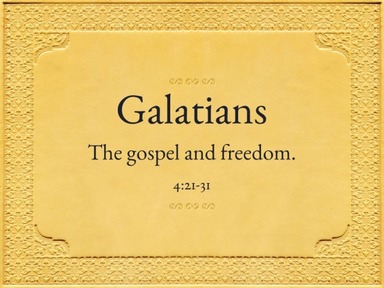Galatians (18)

Sermon • Submitted • Presented • 46:00
0 ratings
· 55 viewsFiles
Notes
Transcript
Introduction:
Transition: Read Galatians 4:21-31.
Four questions to help guide our observations.
What’s the context?
What’s the context?
a. Up to this point in the letter to the Galatians the Holy Spirit has inspired the apostle Paul to confront the false gospel of the Judiazers with a head on collision.
What’s the intent?
What’s the intent?
a. Our focus passage today's is intended to give an illustration from the law in order to reiterate the main argument of the letter. Paul has been explaining the foundations of the gospel that teach a person is made right with God through faith, apart form the law. Now, he uses the law as an analogy to solidify his point. (Read verse 21)
b. He is using the example of Sarah and Hagar as a way to illustrate the major problem going through the Galatians churches. The battle between these two ladies showcase the battle between the true gospel and the false gospel. The battle between the promise and the law. Faith and flesh. Life and death. Work of the Spirit and work of the law. Freedom and slavery. Adoption and alienation. Being clothed with the righteousness of Christ and being clothed with self-righteousness.
What’s the point?
What’s the point?
a. In the same way that Hagar was a human attempt to accomplish God’s promise, so to is keeping the law a fleshly attempt to be justified with God. Justification is on the basis of promise, not human effort. A person is right with God through faith not ability to keep the law. The law itself is evidence of this conflict and even though it may be very attractive to appeal to the law for validation it is deadly to do so. Why? Because that false gospel is stroking the fleshly zeal of self effort and self exultation, and boasting in human ability rather than the sufficient death and resurrection of the Savior.
b. Paul quotes Isaiah 54:1 to make the point. The prophet Isaiah served as God’s spokesman during the time when God’s people were divided into two kingdoms. The northern kingdom called Israel had already been taken into captivity by the Assyrians because of obedience to God. The Southern Kingdom which included the region around the cit of Jerusalem was called Judah. They too were nearing the time when God would bring judgment upon them for their rebellion and the Babylonians would take them into captivity. Isiah is proclaiming a message of warning leading up to this captivity. However, he also delivers a message of salvation as God will prove faithful to His covenant with them and provide a deliverer who will rescue his people.
c. Chapter 54 is follows the proclamation that God will send a Redeemer who will suffer in the place of His people. A Servant who would endure the affliction for the sake of the redeemed. Paul is quoting 54:1 to emphasize the point that God works according to His own plan. And the way that God works is usually very different than the way we operate. We often fall into the trap of believing the lie that we have a working part in our justification. However, those who were enslaved to the elementary principles of this world could never conjure up enough righteousness to please God. No, He has made everything out of nothing, God has brought about life out of death, When we couldn't help ourselves God intervened, He brings fertility out of infertility, freedom from slavery. He is both just and the justifyer. And we should rejoice in the truth that left to our own devices we would be barren, but God has promised, and he remains faithful to His promise. He told aging Abraham that he would have decedents like the sand and stars.. and through them all the nations would be blessed. God fulfilled this promise by His own ability through sending His Son to be born of a woman, born under the law, to redeem those who were under the law. He brings blessing out of ashes and flourishing out of desolation. He will rescue from the domain of darkness those who trust in his Son Jesus the Christ.
Transition: That’s the point.. now for our final question…
How’s the point being applied?
How’s the point being applied?
Identity Reminder (4:28)
Insightful Reflection (4:29)
Instructive Reproof (4:30)
Intentional Recognition (4:31)
